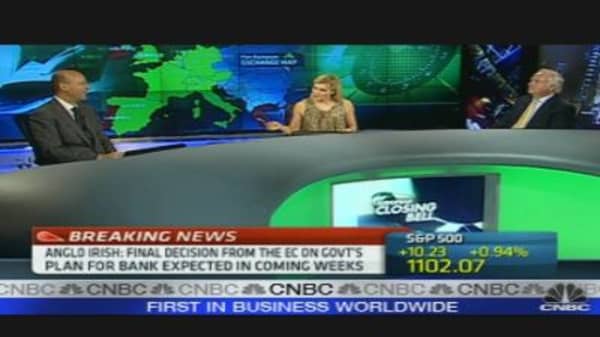The fate of the Irish economy is back in focus for investors across the world, after the former Celtic Tiger extended guarantees to its banking industry and depositors and with the spread on Irish bonds hitting record highs.
The country is also waiting for a decision from the European Commission on the fate of Anglo Irish, the troubled bank that was nationalized two years ago; uncertainty on whether Anglo Irish will be wound down or allowed to survive has weighed on sentiment towards the country.
Ireland is an example of a Western economy adjusting to both the banking crisis and, crucially, the emergence of Asia, Amit Kara, an economist at Morgan Stanley, said.
"Ireland has taken steps to overcome the hangover from the credit boom, but a successful outcome requires the economy to become more competitive and also, and more crucially, a global economic recovery," Kara said.
He is confident the Irish economy will be able to roll over debt in the coming weeks and sees the chance for Irish debt to outperform the likes of Spain.
"Though Ireland faces serious long-term challenges, its liquidity position is healthy and its banks should have sufficient ECB-eligible collateral to significantly offset the funding impact of upcoming debt redemptions," Kara explained.
"Given the underperformance of recent weeks, we see scope for Irish bonds to regain some ground against Portugal and Spain in particular, once the initial round of government-guaranteed bond redemptions has taken place over the first two weeks of September," he added.
What is on Ireland’s Books?
The Irish banking system remains hooked on European Central Bank funding and investors are also worried about the risks posed by the scale of liabilities following Ireland’s decision to guarantee the country's lenders.
"The key concern for bond investors is the significant contingent risk on the Irish state arising from the establishment of the National Asset Management Agency (NAMA) and the government guarantee scheme for bank liabilities," Andrew Rowan, a fixed income strategist at Morgan Stanley, added.
Initially, NAMA predicted the scheme would make a profit of 2.4 billion euros ($3 billion), but now it forecasts a loss. Rowan believes the Irish banking system will be OK but sees risks.
"The scale of capital requirements for Anglo Irish Bank in particular has put Irish spreads under pressure in recent weeks and concerns abound in the market over the potential for further capital needs for this institution," he said.
"It is likely the sector has enough un-pledged collateral to significantly cushion the liquidity impact of the upcoming redemptions, although at the cost of further increasing dependence of the Irish banking system on the ECB," Rowan added.





